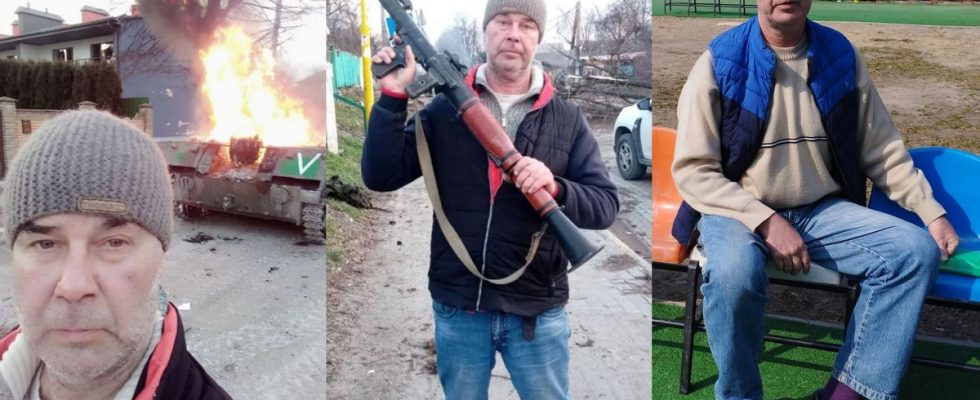“I couldn’t not write. Oleksiy Tarasevich peeks into the prefab common room before disappearing. Poland has invested 67 million euros to set up these small white structures and accommodate Ukrainians displaced by the war, especially here, in Boutcha, in the Kiev region. In the canteen shared by the little houses, a few refugees from the East confide in each other. Oleksiy returns with his arms laden with notebooks and patiently awaits his turn. This trained engineer absolutely wants to testify. During the Russian occupation, from February 27 to March 31, 2022 in this region, he religiously compiled all the facts.
“As of March 5, 2022, I started writing everything almost minute by minute,” he explains, taking a few steps on the synthetic lawn that borders the refuge. Hands clinging to his precious notebooks, the fifties lists the various information he has compiled. Electricity and water cuts, indoor and outdoor temperature, bombardments, troop movements, destruction of Russian tanks, psychological state, etc. “I couldn’t not write. I am witness to a piece of history,” he breathes as a stray dog slips against his legs. “When I was a child, I was already writing in notebooks. So when the Russians came, I knew this writing job would help me survive. Yet Oleksiy’s testimony was hanging by a thread.
Notebooks and weapons hidden in the sofa
The father – whose children are grown and now safe in Austria – lived in Kherson Oblast. At the end of February 2022, the fifties went to Boutcha for a few days to celebrate his father’s birthday. But, under the weight of the war, this short stay turned into months, then more than a year. Behind the window of the apartment, he witnessed the Russian invasion and an entire section of the war with his parents. “At first, I didn’t realize how dangerous it was for me to have these notebooks. Yet I hid them anyway,” he notes. Because the Russian forces could arise at any time in the private apartments in order to carry out searches. Within a month of occupation, Oleksiy and his parents underwent two searches.
Oleksiy’s treasured notebooks and his weapons – two rocket launchers and two Kalashnikovs looted from a destroyed Russian tank column – were hidden inside the sofa. To survive, man has made ingenuity the key word. “When the Russians came knocking on the door, my mother would sit on the couch. She was born in 1941, because of her old age, the Russian soldiers did not dare to move her,” says Oleksiy.
The photographs of Oleksiy Tarasevich per 20 minutes
“But the first thing the Russians wanted to see was the telephone,” he recalls. The searches of the apartments focused primarily on these smartphones, which were screened to determine if a resident was communicating information to the Ukrainian army. To slip through the cracks, “I found a broken phone,” says Oleksiy. “If you told them you didn’t have a phone, you were beaten up because they didn’t believe you. But with this broken phone, they were satisfied and left me alone. »
A witness accompanied by an “excellent guardian angel”
A welcome tranquility because, in thirty-four days of occupation, civilians have witnessed many horrors. One of his neighbors was “tortured to death”. “I took a photograph of his body when we found him a fortnight later,” says Oleksiy. “Me, I almost got shot,” he adds. The 50-year-old was in the street when he came across three Russian soldiers. “The first asked me to sing the Russian anthem. I replied that I did not know the lyrics. He retorted “we’ll teach you the lyrics” and hit me in the face with a reinforced glove. I lost six teeth,” he recalls.
On his knees, a weapon on his neck, Oleksiy was then “convinced that they were going to shoot”. But a bombardment occurred, propelling the three soldiers to the ground: “When I saw them on the ground, I got up and ran away. “I have an excellent guardian angel”, welcomes Oleksiy Tarasevich. Always accompanied by his notes, photographs and videos of the occupation, the father of the family now hopes to publish a documentary book. With all the information that he compiled himself during the occupation of Boutcha, enriched with other testimonies that he hopes to obtain. Because today, like a year ago, Oleksiy “can’t not write”.

